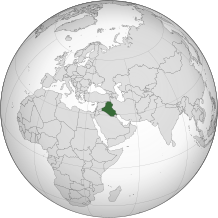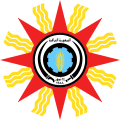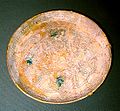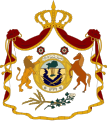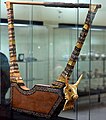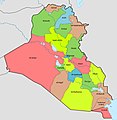Portal:Iraq
The Iraq PortalA view of the former Republican Palace, Baghdad, Iraq
Iraq, officially the Republic of Iraq, is a country in the Middle East and West Asia. It is bordered by Turkey to the north, Saudi Arabia to the south, Iran to the east, Syria to the west, the Persian Gulf and Kuwait to the southeast, and Jordan to the southwest. With a population exceeding 45 million, it is the 35th-most populous country, with the largest city being Baghdad, its capital, and consists of 18 governorates. Iraqi people are diverse; mostly Arabs, as well as Kurds, Turkmen, Yazidis, Assyrians, Armenians, Mandaeans, Persians and Shabakis with similarly diverse geography and wildlife. Most Iraqis are Muslims – minority faiths include Christianity, Yazidism, Zoroastrianism, Mandaeism, Yarsanism and Judaism. The official languages of Iraq are Arabic and Kurdish; others also recognized in specific regions are Assyrian, Turkish, and Armenian. Since its independence, Iraq has experienced spells of significant economic and military growth alongside periods of instability and conflict. It was a part of the Ottoman Empire until the end of World War I, after which Mandatory Iraq was established by the British Empire in 1921, followed by independent Kingdom of Iraq in 1932. Following a coup d'état in 1958, it became a republic, led by Abdul Karim Qasim followed by Abdul Salam Arif and then Abdul Rahman Arif. The Ba'ath Party came to power in 1968 and ruled as one-party state, under the leadership of Ahmed Hassan al-Bakr and then by Saddam Hussein, who started major wars against Iran and Kuwait. In 2003, the Iraq War started after the United States-led coalition invaded Iraq and overthrew the Ba'ath Party. The war subsequently turned into an insurgency and sectarian civil war, with American troops withdrawing in 2011. Between 2013 and 2017, Iraq was once more in a state of war, with the rise and subsequent fall of Islamic State. Today post-war conflict in Iraq continues at a lower scale, which has been an obstacle to the country's stability alongside the rising influence of Iran. (Full article...) Selected article -Ashurbanipal (Neo-Assyrian Akkadian: 𒀸𒋩𒆕𒀀, romanized: Aššur-bāni-apli, meaning "Ashur is the creator of the heir") was the king of the Neo-Assyrian Empire from 669 BC to his death in 631. He is generally remembered as the last great king of Assyria. Ashurbanipal inherited the throne as the favored heir of his father Esarhaddon; his 38-year reign was among the longest of any Assyrian king. Though sometimes regarded as the apogee of ancient Assyria, his reign also marked the last time Assyrian armies waged war throughout the ancient Near East and the beginning of the end of Assyrian dominion over the region. Esarhaddon selected Ashurbanipal as heir c. 673. The selection of Ashurbanipal bypassed the elder son Shamash-shum-ukin. Perhaps in order to avoid future rivalry, Esarhaddon designated Shamash-shum-ukin as the heir to Babylonia. The two brothers jointly acceded to their respective thrones after Esarhaddon's death in 669, though Shamash-shum-ukin was relegated to being Ashurbanipal's closely monitored vassal. Much of the early years of Ashurbanipal's reign was spent fighting rebellions in Egypt, which had been conquered by his father. The most extensive campaigns of Ashurbanipal were those directed towards Elam, an ancient enemy of Assyria, and against Shamash-shum-ukin, who gradually began to resent the overbearing control that his younger brother held over him. Elam was defeated in a series of conflicts in 665, 653 and 647–646. Shamash-shum-ukin rebelled in 652 and assembled a coalition of Assyria's enemies but was defeated and died during Ashurbanipal's siege of Babylon in 648. On account of a lack of surviving records, much of Ashurbanipal's late reign is poorly known. (Full article...) Selected pictureDid you know...
Selected biography -Barham Salih (Kurdish: بەرھەم ساڵح, romanized: Berhem Salih; Arabic: برهم صالح; born 8 September 1960) is an Iraqi Kurdish politician who served as the eighth president of Iraq from 2018 to 2022. He is the former prime minister of the Kurdistan Region and a former deputy prime minister of the Iraqi federal government. He was elected and assumed office as president of Iraq on 2 October 2018. Salih is the third non-Arab president of Iraq, succeeding Fuad Masum, also Kurdish. In October 2022 he lost his re-election to Abdul Latif Rashid. (Full article...)
General imagesThe following are images from various Iraq-related articles on Wikipedia.
ListsTopicsCategoriesRelated portalsReligions in Iraq Arab states Other countries WikiProjectsThings you can do
Associated WikimediaThe following Wikimedia Foundation sister projects provide more on this subject:
Discover Wikipedia using portals
| ||||||||




